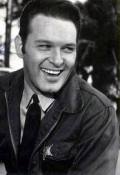 100 Greatest Men: The Complete List
100 Greatest Men: The Complete List
Not many teenage stars get a second shot at stardom, but David Houston was a remarkable exception.
Born and raised in Louisiana, his high tenor voice put him on the map in the fifties, when he was just a teenager. He appeared regularly on Louisiana Hayride, but as he grew older, he had trouble finding opportunities in the music industry.
Houston left the business for a time, but was coaxed back into it by producer Billy Sherrill, who signed him to Epic Records in 1963. He helped put the upstart label on the map with his debut hit, “Mountain of Love”, which reached #2 in 1963.
A few more hits followed, leading up to Houston’s major breakthrough: “Almost Persuaded.” The classic almost cheated anthem spent nine weeks at #1, and pushed Houston to the front of the pack, earning him two Grammys in 1967.
Over the next few years, Houston dominated radio, scoring twenty-four top ten hits through 1974. He recorded a few duet albums with Barbara Mandrell, and his chart-topping “My Elusive Dreams” paired him with a young Tammy Wynette.
In 1972, he joined the Grand Ole Opry, and he continued to record for Epic until 1977. Stints with Gusto and Elektra records followed, the latter label association ending when new label president Jimmy Bowen purged the roster.
Houston played the Opry and toured while recording for independent labels in the eighties. Weeks shy of his 58th birthday, Houston suffered a brain aneurysm, and he passed away in 1993.
Essential Singles:
- Mountain of Love, 1963
- Almost Persuaded, 1966
- My Elusive Dreams (with Tammy Wynette), 1967
- You Mean the World to Me, 1967
- Baby, Baby (I Know You’re a Lady), 1969
Essential Albums:
- Almost Persuaded, 1966
- A Loser’s Cathedral, 1967
- You Mean the World to Me, 1967
- Already It’s Heaven, 1968
- Baby, Baby, 1970
Next: #65. Asleep at the Wheel
Previous: #67. Steve Wariner

David had about a ten year run as a top level recording artist. He was the 17th most popular artist of the 1960s, but he was only charting from 1964 onward – if you were to rate him for the period 1964-1973 he likely would be around #5 or #6 for that time span